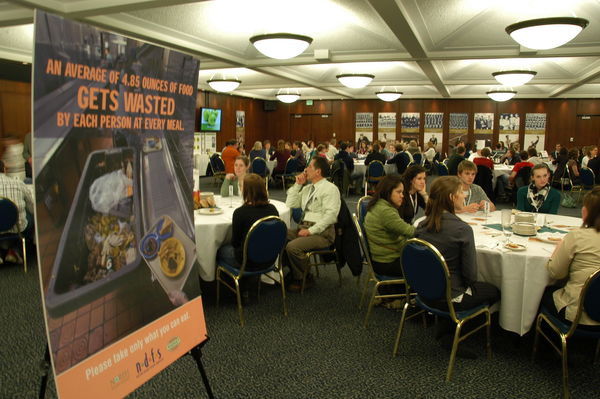
“The differences between restaurant kitchens thirty years ago and restaurant kitchens today are astounding,” said Notre Dame Executive Chef Don Miller during his keynote address at the third annual Green Summit, held in the Joyce Center’s Monogram Room on February 22nd. Chef Miller recounted for the Summit participants how the food industry has changed dramatically in many ways, including how food is packaged and purchased.
He also described the steps that Notre Dame Food Services is taking to purchase local food when available and their achievements in attaining Marine Stewardship Council certification for sustainable seafood. However, Miller stressed that there is still more to be done and he hopes the alliance Notre Dame has forged with other Indiana schools will be a strong advocate for agricultural sustainability in the state.
Executive Vice President John Affleck-Graves’ opening remarks praised the success of past Summits and welcomed new ideas. Quoting a pastoral reflection from the U.S. Bishops’ Conference, he noted that “for some, agriculture is a distant reality, little seen and less understood. When we go to the supermarket, we rarely think about where our food comes from, who produces it, who harvests it, or what it takes to process, package and distribute it.”
A diverse mix of students, faculty, and staff were well represented at the Summit. Attendees rotated through four tables of discussion topics that focused on local food, food waste, sustainable seafood, and food and climate change. During the discussions at each table, participants enjoyed “low-footprint” dishes from the Notre Dame Food Services menu and talked about ways that the university could educate diners and encourage sustainable food choices in the dining halls.
According to student facilitator Alice Griesemer ‘10, one of the participants at her table stressed a need for "changing eating behavior from a ’whatever I want I can have’ mentality to ‘seasonal eating’ where you eat what can be harvested at that time." Other ideas included labeling entrees with their carbon impact, starting an educational vegetable garden on campus, and composting dining hall food scraps.
Participants left the Summit better informed and ready to share what they had learned with dining companions. “Most students don’t know that much of the seafood in the dining hall is from sustainable fisheries. If I had known this, I would have eaten the fish much more often,” remarked student facilitator Chrissy Andrews ’10. Summit planners hope the ideas that came out of the event will lead to tangible improvements. Attendee Mike Redmond said, “I think the Green Summit has been a highlight both years I have gone. It is a great way to raise awareness and meet people.”
The Summit was sponsored by the Office of Sustainability in collaboration with Notre Dame Food Services, GreeND, Students for Environmental Action, Student Government, Gluten-Free ND, and ND For Animals. A summary of the ideas generated at the Summit will soon be available on the Office of Sustainability website.